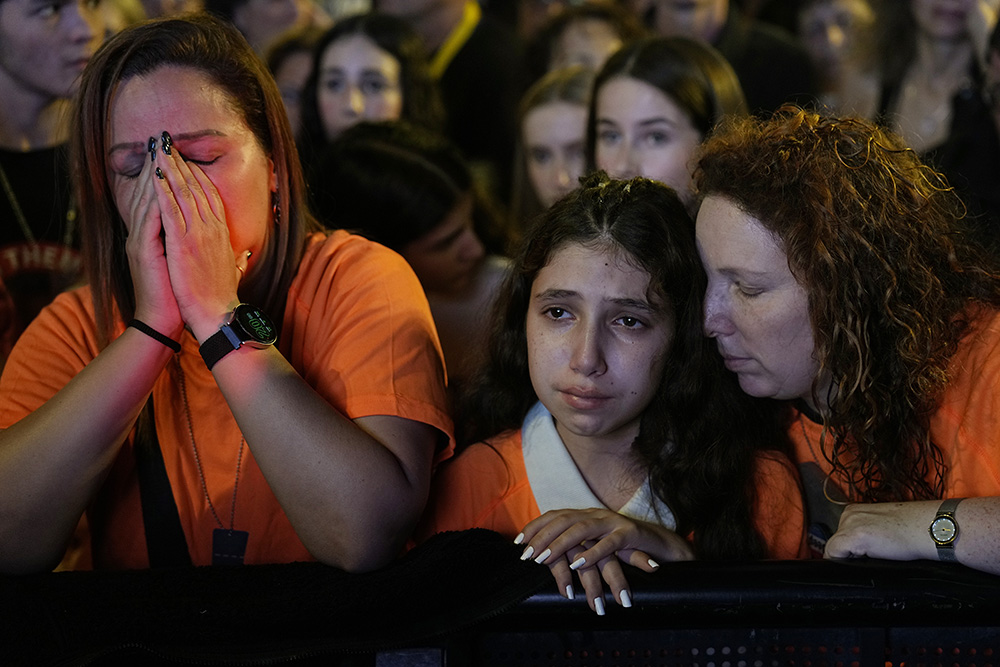
Relatives and friends of hostages held in the Gaza Strip by the Hamas militant group call for their release in the Hostages Square at the Museum of Art in Tel Aviv, Israel, Dec. 2. (AP/Ariel Schalit)
Is it possible to shed some light on the very dark conflict in the Holy Land? Based upon my travels and meetings with local leaders in Israel, the West Bank and Gaza over a period of some 14 years, I believe there is hope. Although my last trips were in 2018, the fundamental dynamics of the conflict have not changed.
During my visits, I met with Jews, Christians and Muslims, with Palestinians and Israelis, with ordinary people and key political and religious leaders. We regularly met the Patriarchs and Heads of Churches in Jerusalem, a group that unites the voices of the various Christian churches, including Catholic, Orthodox, Lutheran and Episcopalian churches.
On Oct. 7, Hamas launched a heinous attack in southern Israel that killed an estimated 1,200 Israelis and took another 240 as hostages. Many were civilians. Hamas' forces did not distinguish between combatants and innocent civilians.
According to the church's "just war" tradition, which is shared by other faiths and affirmed in international law, civilians may not be the object of direct attack.
The Christian leaders in the Holy Land responded swiftly. On the same day, the Patriarchs and Heads of Churches "unequivocally condemn[ed] any acts that target civilians, regardless of their nationality, ethnicity, or faith. Such actions go against the fundamental principles of humanity."
Advertisement
Under international law, every nation has the right to defend its citizens. Israel immediately responded with air strikes in Gaza and later a ground invasion. Israel's stated goal is the elimination of Hamas. Israel's attacks have destroyed whole neighborhoods and caused more than 14,000 deaths and massive displacement, according to Gaza health authorities. Many killed are civilians.
What has the church said in response? The leaders of the churches in the Holy Land "advocate[d] for the cessation of all violent and military activities that bring harm to both Palestinian and Israeli civilians."
Why has Israel's response caused such disproportionate destruction in Gaza? Israel argues that Hamas facilities and tunnels are embedded in civilian areas. This is true.
It is also true that Gaza is a densely populated strip of land about 25 miles long, averaging only 5 miles wide. Of the 2 million Palestinians who live there, one-half are children. Gaza has been blockaded by Israel and Egypt since 2005. It is desperately poor.
The church has not been spared in this latest war. The Christian leaders of the Holy Land condemned "Israeli airstrikes" on St. Porphyrios Orthodox Church in Gaza on Oct. 19. The blasts, they said, caused the "catastrophic collapse of two church halls around the scores of refugees." At least 18 died, nine of whom were children, they said.
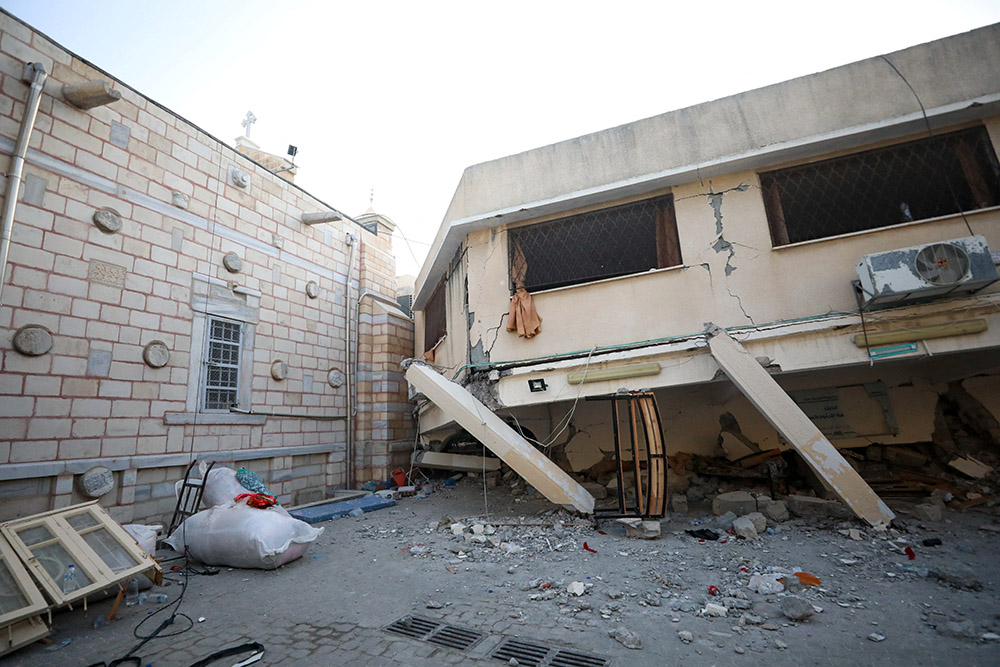
Debris surrounds St. Porphyrios Greek Orthodox Church in Gaza Oct. 20, after an explosion went off the night before. (OSV News/Reuters/Mohammed Al-Masri)
The Christian leaders went on to say, "In condemning this attack ... we cannot ignore that this is but the latest instance of innocent civilians being injured or killed as a result of missile strikes."
Devastation is not new to Gaza. I visited Gaza in 2015 and witnessed firsthand the destruction caused by Israeli retaliatory bombings during the 2014 Gaza War that leveled whole neighborhoods. At that time, the combination of Palestinian rocket attacks on Israel and Israeli airstrikes on Gaza resulted in more than 2,000 deaths, the vast majority of them Palestinian.
I also visited Sderot in southern Israel in 2015. It resembles a typical U.S. suburb, but the bus stops are built of cinderblock and double as bomb shelters. The locals display crude, but deadly, Hamas rockets that land in civilian areas when tensions flare. Even playground equipment doubles as a bomb shelter for children. The fears of both peoples are real.
How did we get here? That road was long and torturous. Here's an oversimplified history.
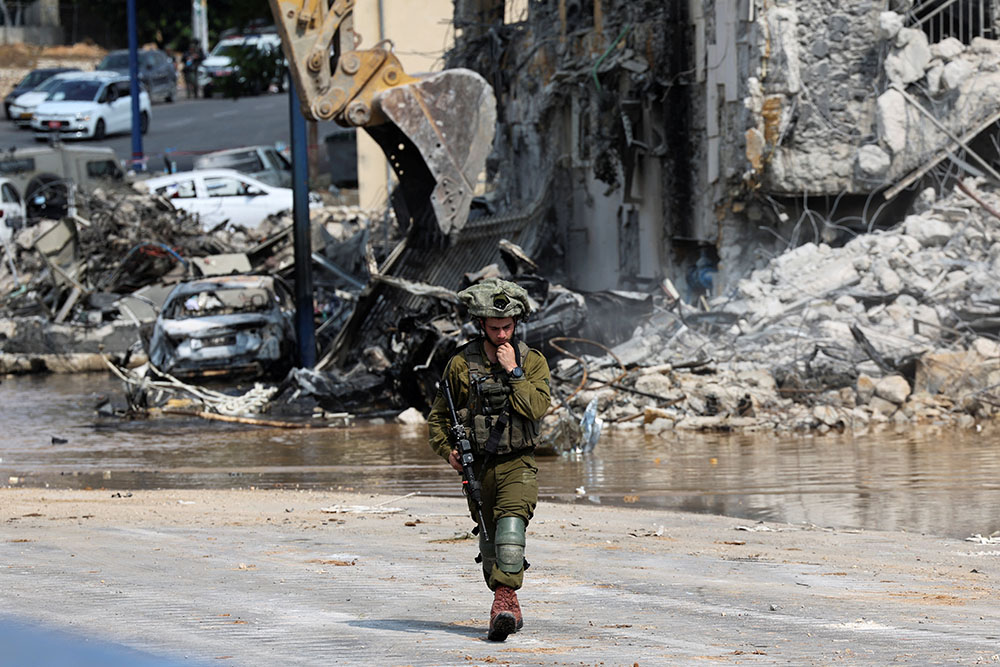
An Israeli soldier patrols near a police station in Sderot, Israel, Oct. 8. The station was destroyed following a mass infiltration by Hamas militants from the Gaza Strip. (OSV News/Reuters/Ronen Zvulun)
The land came under Arab rule in the seventh century. Jews constituted a small minority. Zionism arose in the late 19th century with a goal of reestablishing a Jewish homeland. During World War I, the British took over the administration of Palestine from the Ottomans and encouraged Jewish immigration.
In the Nazi buildup to World War II and in the wake of the horrors of the Holocaust, the Zionist movement became more urgent. Immigration led to tensions with the local Palestinian population.
In 1947, the United Nations proposed a Partition Plan. There would be an Arab state, a Jewish state, and an international zone around Jerusalem, respecting its significance to Jews, Christians and Muslims.
Arabs rejected the U.N. plan as unfair. War broke out. Israel won its War of Independence and gained 78% of the land, more than under the U.N. plan, establishing the borders of modern Israel. Only the West Bank, including East Jerusalem, and the Gaza Strip remained under Arab control. Many Arab Palestinians became refugees. Whole Palestinian towns were depopulated.
For Jews, 1948 marked the re-establishment of a Jewish homeland. For Palestinians, it was Al-Nakba, the catastrophe.
In a statement marking the 75th anniversary of Al-Nakba earlier this year, the Holy Land's Christian leaders affirmed the Palestinian "right to self-determination, state building, and prosperity — allowing all the peoples of this Land to live in peace, dignity, and prosperity."
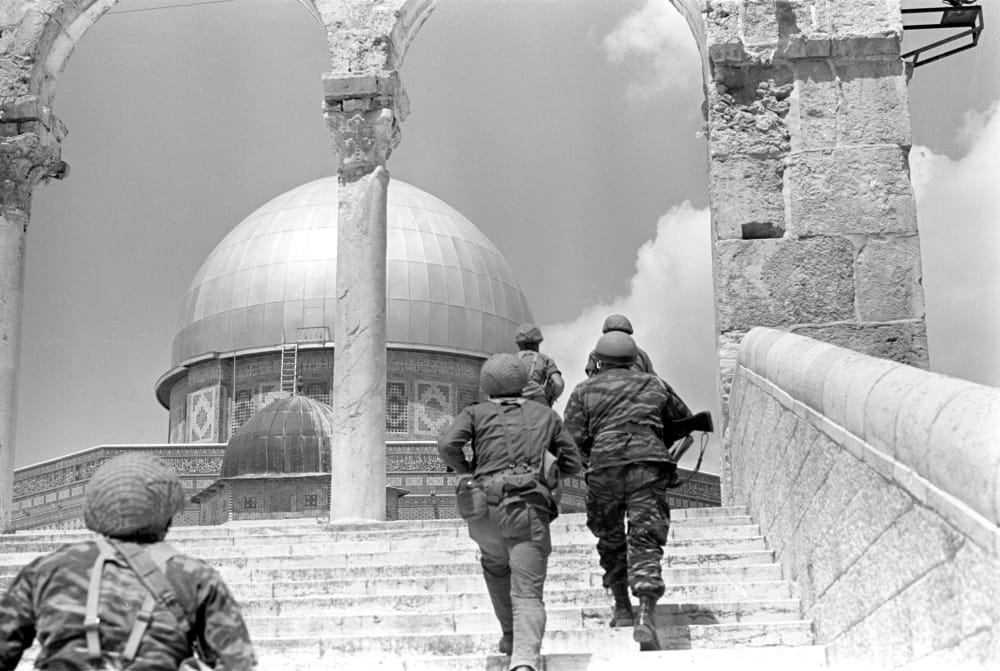
Israeli paratroopers break through into the Old City of Jerusalem, the entrance to the Temple Mount, during the Six-Day War in June 1967. (Wikimedia Commons/עמוס צוקר/IDF Spokesperson's Unit/CC BY-SA 3.0)
Skipping ahead, let's turn to 1967. The Six-Day War was fought between Israel and a coalition of Arab states. It resulted in the Israeli occupation of the West Bank, including Arab East Jerusalem, and the Gaza Strip. Another war was fought in 1973.
Despite the violence, there have been signs of hope over the decades. Israel and Egypt signed a peace treaty in 1979, and Israel and Jordan signed one in 1994. The Oslo Accords between Israel and the Palestinian Liberation Organization in the 1990s aimed at achieving peace based on U.N. resolutions that call for mutual recognition of all states in the region and Israeli withdrawal from occupied territories, while affirming the "right of the Palestinian people to self-determination."
The hopes embodied in these and other international peace efforts are shared by the local church. In their Oct. 7 statement, the Patriarchs and Heads of Churches in Jerusalem "call[ed] upon the international community to redouble its efforts to mediate a just and lasting peace in the Holy Land, based on equal rights for all and on international legitimacy."
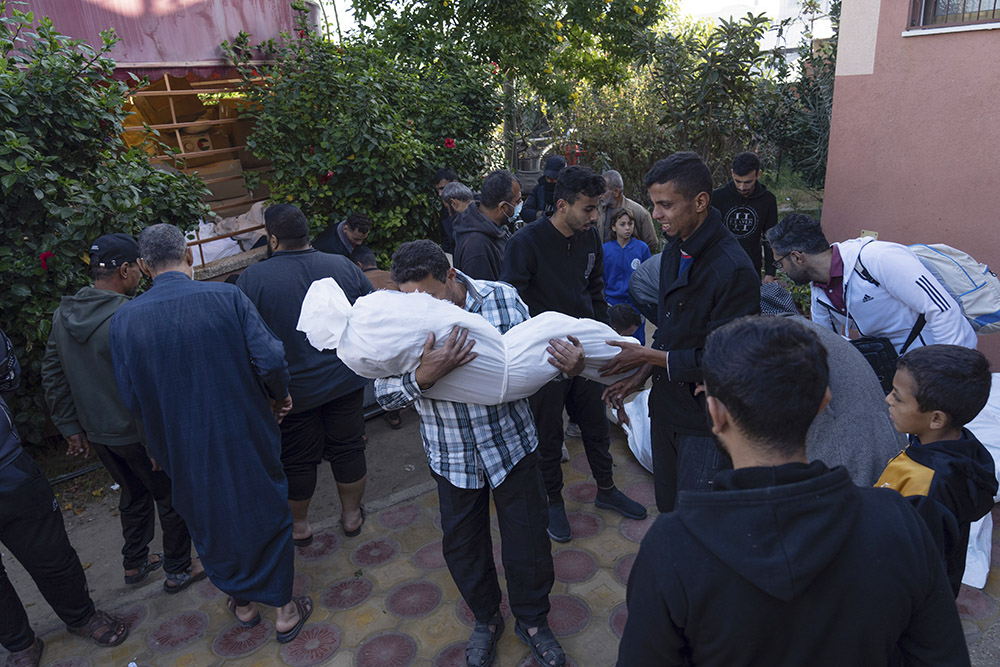
Palestinians mourn their relatives killed in the Israeli bombardment of the Gaza Strip Dec. 3. (AP/Fatima Shbair)
Tragically, actors on both sides undermine the possibility of peace. Hamas' failure to recognize Israel, its call for Israel's destruction, and its indiscriminate attacks on Israelis, including suicide bombings, rocket attacks, and the murders and kidnappings of Oct. 7, terrorize Israelis. They also undermine the legitimacy of the Palestinian quest for self-determination.
Israel's disproportionate military reprisals compromise its international standing. Israel undermines the possibility of peace by its oppressive occupation, blockade of Gaza, expansion of settlements in the occupied West Bank, regular demolitions of Palestinian homes, extremist settlers' attacks on Palestinians, and failures to honor religious access to sites holy for Christians and Muslims.
Jerusalem is home to Jewish prayer at the Western Wall, Christian prayer at the Church of the Holy Sepulcher, and Muslim prayer at the Al-Aqsa Mosque, Islam's third-holiest site.
Jerusalem lies at the center of the conflict. Radical Israelis engage in provocative actions at Al-Aqsa. Christians are intimidated by Israeli extremists and Christian sites are defaced.
The Christian leaders of the Holy Land reminded the world that they have "time and again appealed for the importance of respecting the historic and legal Status Quo" of the Holy Places.
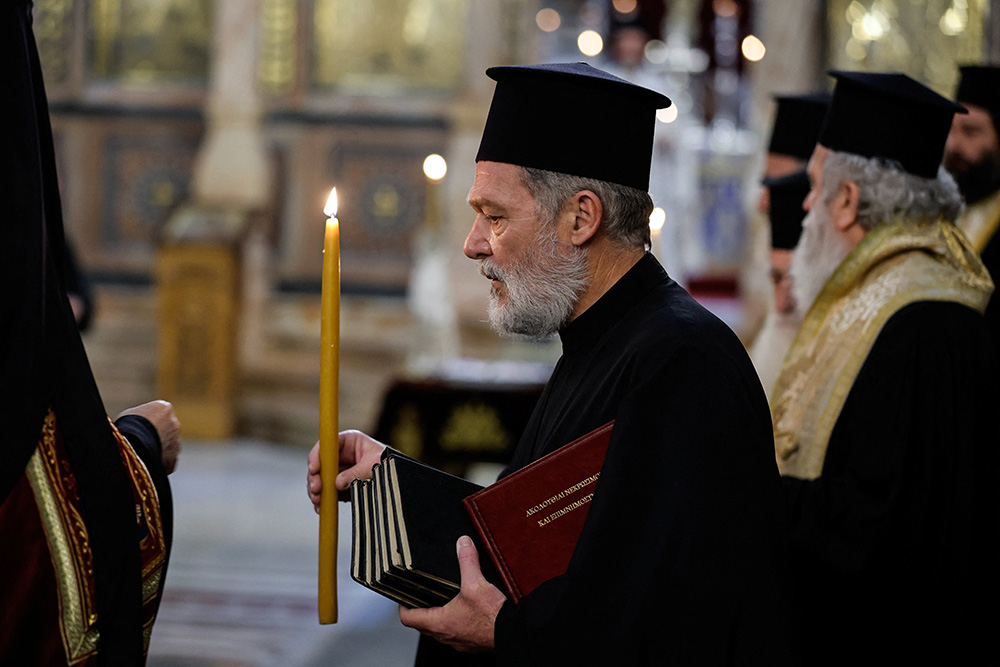
Worshippers take part in a special prayer for peace at the Church of the Holy Sepulcher in Jerusalem's Old City Oct. 22, amid the ongoing conflict between Israel and the Palestinian Islamist group Hamas. (OSV News/Reuters/Ammar Awad)
In this year's Easter message, they stated plainly, "Some of our churches, funeral processions, and places of public gathering have become targets of attack; some of our holy sites and cemeteries have been desecrated; and some of our ancient liturgies ... have been closed off to thousands of worshipers."
At the outset of the war, the church leaders in Jerusalem implored political leaders "to engage in sincere dialogue, seeking lasting solutions that promote justice, peace, and reconciliation for the people of this land, who have endured the burdens of conflict for far too long."
What are the elements of a long-term solution? A just peace demands an end to both the violence of terrorism and the violence of occupation. It demands recognition and security for Israel. Nonviolent resistance to the violence of occupation would better serve the Palestinian cause. Terror attacks and indiscriminate rocket fire on Israeli civilians must end.
A just peace demands an end to Israeli occupation of the West Bank, Arab East Jerusalem and Gaza, and an end to the expansion of settlements in the West Bank. Justice demands the establishment of a Palestinian state or confederation with equal rights for all.
It also requires an agreement on Jerusalem that protects religious freedom and other basic rights, and the aspirations of both Israelis and Palestinians.
Visionary leaders could find light at the end of the tunnel.







